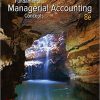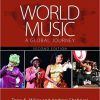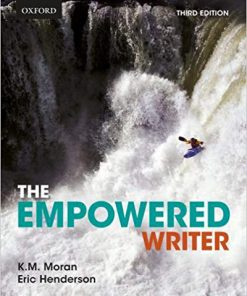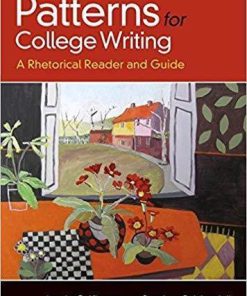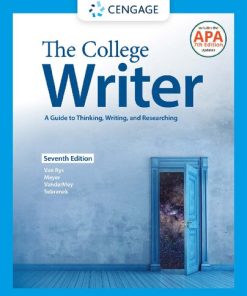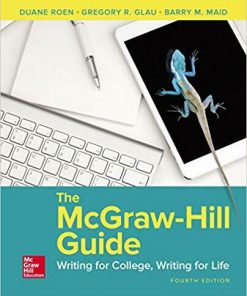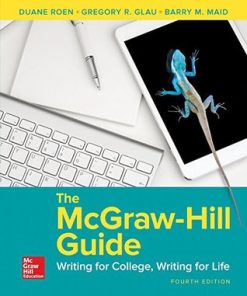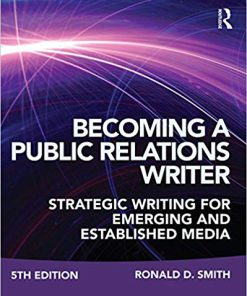(eBook PDF) The College Writer: A Guide to Thinking, Writing, and Researching 5th Edition
$50.00 Original price was: $50.00.$35.00Current price is: $35.00.
(eBook PDF) The College Writer: A Guide to Thinking, Writing, and Researching 5th Edition – Instant Download
(eBook PDF) The College Writer: A Guide to Thinking, Writing, and Researching 5th Edition – Digital Ebook – Instant Delivery Download
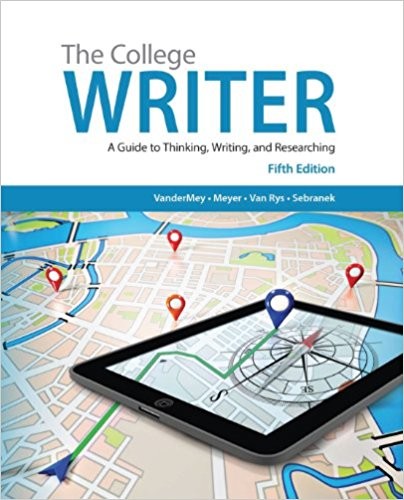
product details:
- ISBN-10 : 1285438019
- ISBN-13 : 978-1285438016
- Author: David Croteau, William Hoynes
Combining streamlined instruction in the writing process with outstanding accessibility, THE COLLEGE WRITER is a fully updated four-in-one book-with a rhetoric, a reader, a research guide, and a handbook-for users at any skill level. Throughout the book, numerous student and professional writing samples highlight important features of academic writing-from voice to documentation-and offer models for users’ own papers. The fifth edition features a greater focus on writing across the curriculum, further supported within the research chapters by additional coverage of report writing, primary research, and avoiding plagiarism.
table of contents:
Part I: RHETORIC: COLLEGE STUDENT’S GUIDE TO WRITING. Reading, Thinking, Viewing, and Writing.
1. Critical Thinking Through Reading, Viewing, and Writing.
2. Beginning the Writing Process.
3. Planning.
4. Drafting.
5. Revising.
6. Editing and Proofreading.
7. Submitting Writing and Creating Portfolios. The College Essay.
8. One Writer’s Process.
Part II: READER: STRATEGIES AND SAMPLES.
9. Forms of College Writing. Three Curricular Divisions. Writing in the Humanities. Writing in the Social Sciences. Writing in the Natural Sciences. Critical-Thinking and Writing Activities. Learning-Objectives Checklist.
10. Narration, Description, and Reflection. Strategies for Personal Essays. Brief Narratives: Anecdotes. Sample Personal Essays. “The Entymology of Village Life,” by Robert Minto. “Spare Change,” by Teresa Zsuffa. “When Dreams Take Flight,” by Elizabeth Fuller. “Call Me Crazy, But I Have to Be Myself,” by Mary Seymour. “The Muscle Mystique,” by Barbara Kingsolver. Writing Guidelines. Critical-Thinking and Writing Activities. Learning-Objectives Checklist.
11. Cause and Effect. Strategies for Cause-Effect Essays. Sample Cause-Effect Essays. “The Slender Trap,” by Tina Rhys. “Dutch Discord,” by Brittany Korver. “If You Let Me Play,” by Mary Brophy Marcus. “Mind Over Mass Media,” by Steven Pinker. Writing Guidelines. Critical-Thinking and Writing Activities. Learning-Objectives Checklist.
12. Comparison and Contrast. Strategies for Comparison-Contrast Essays. Sample Comparison-Contrast Essays. “Sethe in Beloved and Orleanna in Poisonwood Bible,” by Rachel DeSmith. “Shrouded in Contradiction,” by Gelareh Asayesh. “Shades of Prejudice,” by Shankar Vedantam. “The Likeness Across the Atlantic,” by Peter Baldwin. Writing Guidelines. Critical-Thinking and Writing Activities. Learning-Objectives Checklist.
13. Classification. Strategies for Classification Essays. Sample Classification Essays. “Latin American Music,” by Kathleen Kropp. “Four Sides to Every Story,” by Stewart Brand. “The Lion, the Witch, and the Metaphor,” by Jessica Siegel. Writing Guidelines. Critical-Thinking and Writing Activities. Learning-Objectives Checklist.
14. Process. Strategies for Process Essays. Sample Process Essays. “Wayward Cells,” by Kerri Mertz. “The Emancipation of Abe Lincoln,” by Eric Foner. “Saint Caesar of Delano,” by Richard Rodriguez. Writing Guidelines. Critical-Thinking and Writing Activities. Learning-Objectives Checklist.
15. Definition. Strategies for Definition Essays. Sample Definition Essays. “Economic Disparities Fuel Human Trafficking,” by Shon Bogar. “Deft or Daft,” by David Schelhaas. “On Excellence,” by Cynthia Ozick. “Wikipedia and the Meaning of Truth,” by Simon L. Garfinkle. Writing Guidelines. Critical-Thinking and Writing Activities. Learning-Objectives Checklist.
16. Reading Literature: A Case Study in Analysis. Strategies for Analyzing Literature and the Arts. Approaches to Literary Analysis. “Four Ways to Talk about Literature,” by John Van Rys. Analyzing a Poem. “The Time Around Scars,” by Michael Ondaatje. “The Stories Scars Hold: An Explication of Michael Ondaatje’s ‘The Time Around Scars,'” by Michael Doyle (Student). Analyzing a Short Story. “Good Country People,” by Flannery O’Connor. “‘Good Country People’: Broken Body, Broken Soul,” by Anya Terekhina (Student). Analysis of a Novel. “Ah, the Power of Women: Louis Erdrich’s ‘Love Medicine'” by Aleah Stenberg. Literary Terms. Poetry Terms. Writing Guidelines. Critical-Thinking and Writing Activities. Learning-Objectives Checklist.
17. Strategies for Argumentation and Persuasion.
18. Taking a Position.
19. Persuading Readers to Act.
20. Proposing a Solution.
21. Taking Essay Tests. Reviewing for Tests. Forming a Study Group. Consider the Testing Situation. Taking the Essay Test. Writing Under Pressure: The Essay Test Quick Guide. Taking an Objective Test. Tips for Coping with Test Anxiety.
22. Writing for the Workplace. Writing the Business Letter. Writing Memos and E-mail. Applying for a Job.
23. Preparing Oral Presentations. Organizing Your Presentation. Writing Your Presentation. “Save Now or Pay Later,” by Burnette Sawyer. Developing Computer Presentations. Overcoming Stage Fright Checklist.
Part III: RESEARCH AND WRITING.
24. Getting Started: From Planning Research to Evaluating Sources.
25. Conducting Research: Primary, Library, Web.
26. Building Credibility: Avoiding Plagiarism.
27. Drafting Papers with Documented Research.
28. MLA Style.
29. APA Style. Part IV: HANDBOOK.
30. Marking Punctuation.
31. Checking Mechanics.
32. Using the Right Word.
33. Understanding Grammar.
34. Constructing Sentences.
35. Avoiding Sentence Errors.
36. Multilingual and ESL Guidelines.
people also search:
You may also like…
Ebook-PDF
(eBook PDF) The Empowered Writer An Essential Guide to Writing, Reading, and Research, Third Edition
Languages - Rhetoric
Reference - Writing
Invention and Craft: A Guide to College Writing 1st Edition Ronda Leathers Dively – eBook PDF
Languages - Grammar, dictionaries & phrasebooks
The McGraw-Hill Guide: Writing for College, Writing For Life – eBook PDF
Reference - Writing

